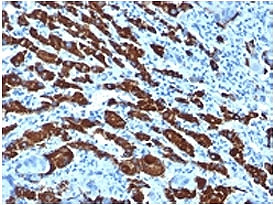- Tel: 858.663.9055
 Email: info@nsjbio.com
Email: info@nsjbio.com
- Tel: 858.663.9055
- Email: info@nsjbio.com
Hepatocellular Carcinoma Marker Antibody reagents target proteins associated with hepatocellular carcinoma (HCC), the most common primary liver cancer. HCC arises predominantly in the context of chronic liver disease, cirrhosis, or viral hepatitis and is among the leading causes of cancer-related mortality worldwide. Because HCC often develops silently, early detection through biomarkers is vital for improving patient outcomes.
Common hepatocellular carcinoma markers include alpha-fetoprotein (AFP), Glypican-3 (GPC3), HepPar-1, cytokeratins 8/18, and heat shock protein 70. These proteins are routinely studied for their diagnostic and prognostic value. The Hepatocellular Carcinoma Marker Antibody enables researchers and clinicians to detect these critical markers in tissue sections, blood samples, and experimental models, while Hepatocellular Carcinoma Marker Antibodies more broadly provide tools to advance oncology, pathology, and translational medicine.
NSJ Bioreagents supplies Hepatocellular Carcinoma Marker Antibodies validated for immunohistochemistry, immunofluorescence, western blotting, ELISA, and flow cytometry. Each Hepatocellular Carcinoma Marker Antibody undergoes rigorous quality control to ensure high specificity and minimal cross-reactivity.
By choosing Hepatocellular Carcinoma Marker Antibodies from NSJ Bioreagents, scientists gain reagents optimized for reproducibility. Our antibodies provide clear staining in liver tissue biopsies, consistent protein detection in lysates, and strong performance across multiple platforms. Detailed datasheets, suggested controls, and validated protocols support accuracy and reproducibility in research and diagnostics.
The Hepatocellular Carcinoma Marker Antibody has wide-ranging applications in cancer biology, diagnostics, and translational medicine.
Hepatocellular Carcinoma Marker Antibodies detect biomarkers such as AFP and GPC3.
The Hepatocellular Carcinoma Marker Antibody clarifies tumor heterogeneity and molecular subtypes.
Hepatocellular Carcinoma Marker Antibodies support studies of cancer initiation and progression.
Hepatocellular Carcinoma Marker Antibodies help distinguish HCC from metastatic tumors in the liver.
The Hepatocellular Carcinoma Marker Antibody provides diagnostic clarity in biopsy samples.
Hepatocellular Carcinoma Marker Antibodies are applied in panels with HepPar-1 and CK8/18 to confirm hepatocyte origin.
Hepatocellular Carcinoma Marker Antibodies detect biomarkers associated with prognosis.
The Hepatocellular Carcinoma Marker Antibody helps stratify patients for therapy.
Hepatocellular Carcinoma Marker Antibodies support personalized oncology approaches.
Hepatocellular Carcinoma Marker Antibodies validate biomarkers for clinical trials.
The Hepatocellular Carcinoma Marker Antibody supports monitoring of treatment efficacy.
Hepatocellular Carcinoma Marker Antibodies help assess recurrence risk post-surgery.
Hepatocellular Carcinoma Marker Antibodies are applied in studies linking hepatitis B/C to HCC.
The Hepatocellular Carcinoma Marker Antibody clarifies mechanisms of virus-driven tumorigenesis.
Hepatocellular Carcinoma Marker Antibodies help evaluate hepatocyte-derived stem cell models for safety.
The Hepatocellular Carcinoma Marker Antibody ensures engineered tissues are free of malignant signatures.
HCC is one of the deadliest cancers, and early detection is critical for improving survival rates. The Hepatocellular Carcinoma Marker Antibody provides a trusted tool for detecting and studying HCC-associated proteins, while Hepatocellular Carcinoma Marker Antibodies more broadly support oncology, pathology, and translational research.
In basic science, Hepatocellular Carcinoma Marker Antibodies clarify molecular pathways driving liver cancer. In diagnostics, the Hepatocellular Carcinoma Marker Antibody supports clinical pathology and biomarker discovery. In translational medicine, Hepatocellular Carcinoma Marker Antibodies validate therapeutic targets and help monitor treatment response.
Clinically, markers such as AFP and GPC3 are part of diagnostic panels for HCC. The Hepatocellular Carcinoma Marker Antibody ensures specificity and reproducibility, bridging research discovery with clinical application.
Hepatocellular carcinoma is a global health burden, and sensitive markers are essential for advancing both research and patient care. The Hepatocellular Carcinoma Marker Antibody equips researchers and clinicians with a reliable reagent for detecting HCC-associated proteins, while Hepatocellular Carcinoma Marker Antibodies more broadly support oncology, pathology, and translational medicine. By linking molecular insights with diagnostics and therapeutics, these antibodies remain indispensable for improving cancer outcomes.

IHC staining of human hepatocellular carcinoma tissue with Hep Par 1 antibody (clone OCH1E5). HIER: boil tissue sections in pH 9 10mM Tris with 1mM EDTA for 20 min and allow to cool before testing.